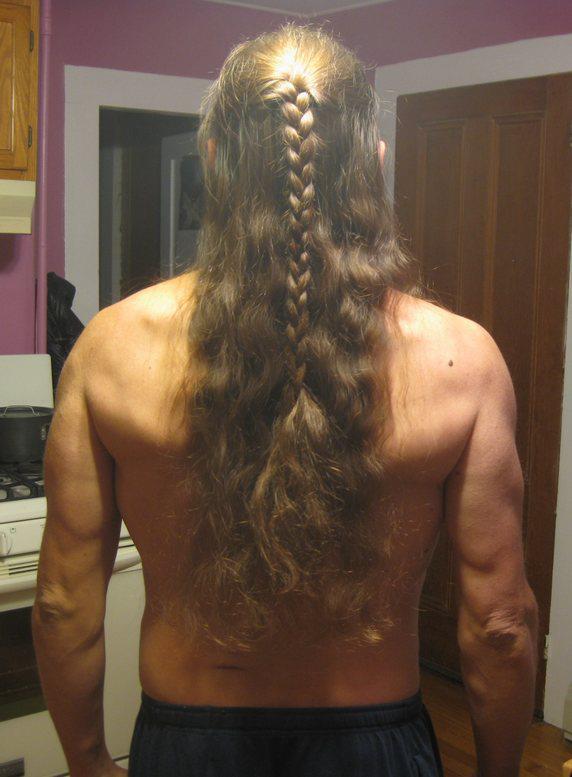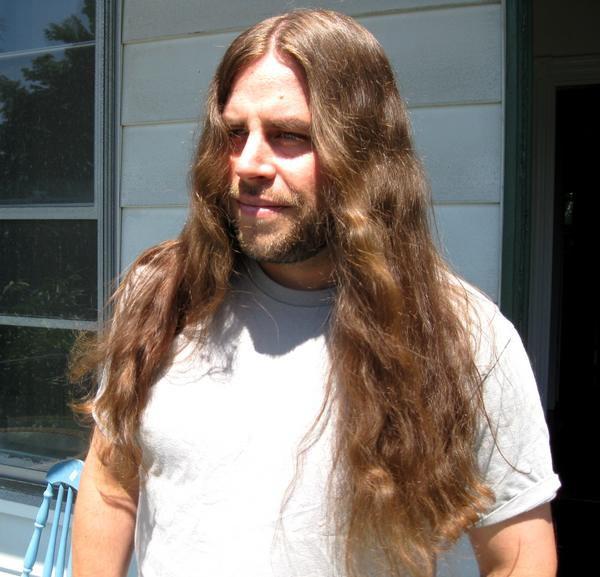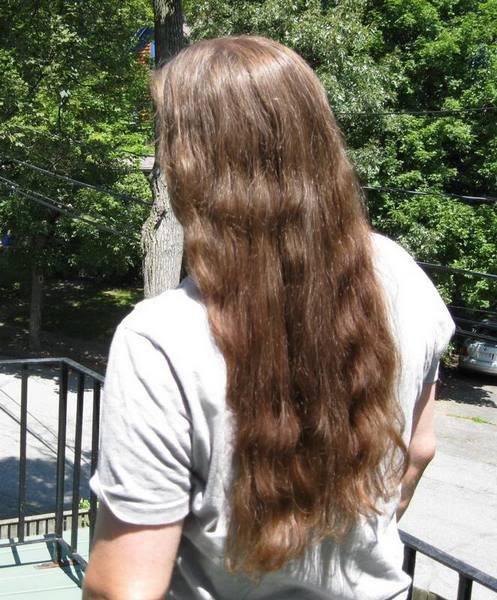Men with flowing tresses have been in the news lately, between Jared Leto’s Oscar win and Jon Snow’s GQ cover. Additionally, we have been told of the rise of the man bun and the dandy flop. But little is known about the long-hair community, a vibrant online network of men “with hair long enough to fall upon the shoulders.” Longhairs have great tips on how to keep your locks healthy, but they also deal with bias and abuse as they test the edges of traditional gender roles. I spoke with Jason Bartlett, a moderator of a pioneer long-hair website, about dating, religion, and finding his own mane’s “terminal length.”
Slate: I didn’t know there was a long-hair community before finding the Men’s Long Hair Hyperboard.
Jason Bartlett: Yes, it’s a real community. I mean, if I’m out at a concert and I see another longhair, we give each other a little head nod. The site itself started in 1996, and now we link to a lot of long-hair groups geared toward both men and women.
I came to MLHH in 1999. I had short hair then, because I was part of a religion [Jehovah’s Witnesses] that enforced that. But my connection [to the Witnesses] was fading. When I got on the Internet, one of the first things I did was type in “men’s long hair.” Of course, in order to be a MLHH moderator, you have to already have long hair. I didn’t progress in the hierarchy until I left my religion for good, in 2005.
Slate: Are the hair restrictions part of the reason you left?
Bartlett: It was complicated.
Slate: What made you want to become a longhair?
Bartlett: What we have found is that longhairs fall into two different groups. One group is innate—men who’ve known they wanted to grow their hair long since they were 6 or 7. It’s in them and a part of them. For me, it’s one of my earliest recollections. For other men, it’s more like a fashion statement that comes and goes—for instance if they want to join a rock band.
My problem was that I had parents who weren’t supportive of the idea, and I couldn’t have picked a worse culture to be born into. The Witnesses don’t allow beards, goatees, or long hair on men. But I felt like it was a part of me, that this was how I should look. I started to push the limits, growing it long on top and seeing what I could get away with. If I hadn’t been raised a Witness, I would certainly have worn my hair long as a young boy.
Slate: What do you think your long hair expresses about you?
Bartlett: Primarily that it’s a part of me. I couldn’t care less if it goes in and out of style, and I don’t care what people think. But I do like the connotations of long hair. We’re individualists; we go to the beat of our own drum. We have a nonherd mentality. But the connotations aren’t why I do it. I’m not trying to signal anything.
Slate: How do people react to your hair?
Bartlett: Well, I sometimes get harassed in airports. Certain people may draw conclusions about me based on my hair. But I think attitudes have really changed, even from 20 years ago. I approach people without trepidation. On the other hand, I started my job when I had short hair, and I haven’t been in the job market to see how that would be. It’s a topic that comes up a lot on the message board: I need to find a job. What are my options? People come back with success stories, saying their employers never even mentioned their hair, that they didn’t feel it was an impediment.
Slate: Do you get positive responses too?
Bartlett: Oh, sure. Stuff like, “Hey, cool hair.” In the dating world, I was very open about the fact that I had long hair, and I had no problem finding women who were attracted to it. I would never cut my hair for a woman. On my first date with the woman who became my wife, she commented on how much she liked my hair.
Slate: Do you judge guys with short hair?
Bartlett: No. That is not at all what we’re about. Sometimes it’s just: OK, this man has short hair. Does he want to have short hair? Or is he afraid? If he’s not afraid, if having short hair is who he is, then we respect that. But there is a percentage of men out there who would probably have longer hair if they didn’t fear the repercussions.
Slate: Is there a hierarchy based on hair length at MLHH?

Jason Bartlett
Bartlett: You’re definitely part of the community the second you begin the process. But, yes, I would say the pillars, the guys we consider supermembers, are especially long. We’ve got a few men with knee-length hair. Most men and women can’t do that genetically. So when the ones who can post pictures and offer advice, they’re given more honor. And those with the most amazing length and thickness combined, we give them superstar status.
Part of this is practical. I’m a cyclist, and I have to find ways to deal with the damage that causes. Being active with knee-length hair, I can’t imagine. When I first started, I was naïve about terminal length, which is the natural limit of how long your hair can grow. Around 2008, my hair started slowing down. The most I can get it to is my waist, and I usually cut a few inches above that, because otherwise the ends get ratty. I have fine hair. Men with coarser hair have a better chance of having it look nice at the ends.
Slate: What products do you use?
Bartlett: I try to go light on the shampoo, making sure it doesn’t run down the length of the hair, because that can be damaging. I am more focused on conditioners: My hair does best with rotating conditioners. I especially like Suave Coconut—Suave used to have a whole bunch of great options, but they’ve cut their line down. Instead of leave-in conditioner, many of us use various oils. Apply a little coconut oil or Ojon oil to damp hair, and it does wonders. I never use a comb, but I’ll use a boar-bristle brush on my scalp and on down to my neckline. For below my neckline, I just use my hands, because untangling hair with your fingers is less damaging, especially when the hair is wet.
I wear a braid every day. My hair works well in a braid, and I tried to learn braiding as soon as possible. I always felt it was my style. But I started with a ponytail at first. Longhairs go through an awkward phase when they’re growing their hair out—it’s getting longer but it’s not yet long enough to tie back. You’ve sort of “made it” once you can tie it back. A lot of guys get discouraged during that stage. In our vernacular, it took me about 18 months to “arrive.”
Slate: What do you think of Jared Leto?
Bartlett: I’m very happy about Jared Leto. We are all for long hair on men becoming more popular. It makes it easier for us, especially when we’re looking for work, trying to be accepted. I think that when more men see very public figures growing their hair out, the idea gets planted in their heads.

Jason Bartlett
